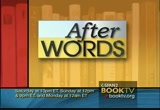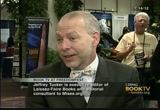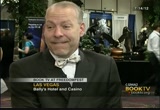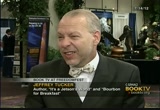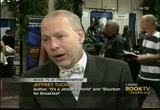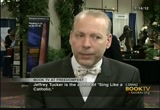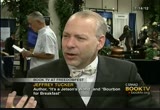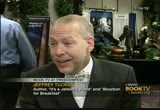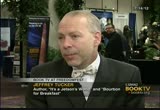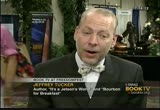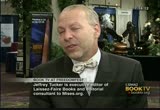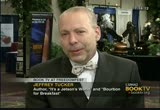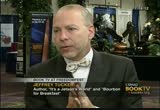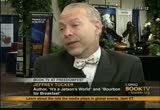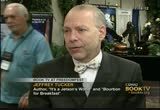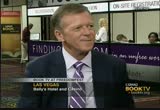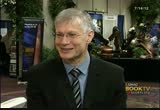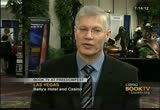tv Book TV CSPAN September 16, 2012 1:00pm-1:20pm EDT
1:00 pm
1:01 pm
>> well, you know, these are both very dangerous books. thank you for having me on. prospect of miracles that surround. the technology. so mass-transit dreams come everyone has a breakout and realizes the visual it was just a big dream. walter cronkite will be on the are giving you the news. it all seems to be true. i don't know. so many things that are amazing. let me give one example. i was driving in a small town in the midwest wrecking for restaurant to eat. i used a quick application.
1:02 pm
i found all the restaurants that were around me. was able to click on one i liked apple of the media. have the daily special. it's like having extradition. also, the drawing attention. more important the, the sources in the market economy, not government. >> well, what is the first as part of your book? >> the part that the government runs. the fiscal world that breaks down. live in a highly regimented physical world. the day-to-day bureaucracies are getting more and more rules. how things have to be made. we're seeing a kind of breakdown , of the fiscal principles. in due to these regulations, washing machines or dryers or toasters or hot water heaters,
1:03 pm
everything is so heavily regulated now. things are not working as well as they used to. so it's a strange thing. on the one hand, the free world of the digital economy. we have massive innovations. more spectacular than ever. in the physical world things are kind of. [indiscernible] so the book tries to draw attention to the contrast and draw out the cause of effect relationship. the visual economy is growing a progressing and serving so many people because it's a freer society. >> well, one of the examples you talk about, one of your chapters is about the fact that students should try to work for free. >> note this is a very serious problem. unemployment. it's a gigantic problem. young kids and not getting work experience and more.
1:04 pm
when i was younger and a zeroth store workers was to over 13. now it's almost impossible to get to work at all until your 16 at the very latest. of surged. fewer and fewer opportunities. what i suggest coming get to work as soon as you possibly can, even if that means working for free city can build of context and develop a network so you can have a nuys resonate and people recommended. work is very important for building character. i argue, the workplace is an important educational institution. more important than the usual education that you get. dealer had to deal with other people. you learn how to deal with the authority. you have to be creative in the job market place. all these things. you learn how to have money. this is an experience that all americans have had really since the beginning of our country. the current generation does not have.
1:05 pm
it's serious problem. >> how does that fit into your jets as world? private miracles. >> what i try to do in the book is not just draw attention to miracles, which i think is important to be aware of to my how wonderful this. the conscious of it to land and to be aware of the problem, the way regulations are kind of causing this. but i also tried to provide solutions. at think it's important to people realize that even in an age of what i call despotism you have to still have offal and free life in whatever way you can. so this is one of the solutions i suggest to young people. get to work. find a place you can volunteer your efforts in interest yourself into division of labor because what's going to come in, you will be on your own, out of that and you will have to provide for yourself and your loved ones. >> jeffrey tucker, the title, --
1:06 pm
>> this is -- it came from -- i went over to have breakfast with a very old scholar at auburn university. greek and latin. it just one of these old gentlemen. the very first thing he said, would you like a cup of coffee. would you like bourbon in the coffee? was shocked. drinking in the morning. it's a taboo. what's interesting contrast. this old scholars southern gentleman piloting one of the great taboos, drinking in the morning. i said, yes. of course i would. so it was kind of this moment. i realize, lot of the things we think it's true or not true. we have a kind of fun world where you obey the central plan. for supposed to not give the college until or 18. the work into your 16. it's like their is a map for our lives that is imposed upon us. the book urges us to think
1:07 pm
outside the box. think about ways to do things in new ways. don't just accept what people tell you. try new things and considered different points of view. the title is a window into a very sustained less orthodox. but. >> also, you talk about the fact that morality in your view does not come from the state. one of the examples you use is the greece. >> that's true. i do. funny you mention that. also a big fan of lard. i consume a lot of lard. syria. that's another example. i love lard. i love festered. i'm a friend fast food in this book. i love mcdonald's. i think taco bell, crazy for
1:08 pm
walmart. by was watching a movie of the day. ahead of the socialists. all organized and making demands and saying what they wanted. they wanted the working man and woman to have health care, to have housing, access the things that the rich had. i agree with everything is said. their ideals were my ideals. what brought them to list? not a socialist. it was the same. the free market is delivering to us the old bulls of the socialists from a century ago. we to realize that and come to terms with that. down on walmart. when i go walmart i see the masses shopping, giving great stuff of low prices. this is just like mecca, heaven. the dream of every great
1:09 pm
philosopher from the beginning of time to achieve something. lighter we appreciate? and don't understand it. anyway, the friend that, too. >> jeffrey tucker, you talk about the piano industry. >> yes. >> with the current debate on outsourcing going on among the highest political levels, what is your take on it? >> and plenty brought that up. that was an interesting aspects of research. i got into the piano industry when i was in the market for a piano. i heard some of these old american can has never made. they sound beautiful. orchestral the interesting instruments. totally different in the year to date. i began to listen to the piano industry. there was a piano in every home. i've gone over that in the book. it was a major part of the american economy. at some point it became the lager and economically feasible world to manufacture. they moved, you know, to japan
1:10 pm
and korea now. china is a major manufacturer of pianos, but my point, there was no panic. i don't recall anybody panicking. oh, the panels are leaving the u.s. shores. outsourcing pianos and losing jobs. it's just part of the normal market process that takes place. it's part of economic development. we have to let it play itself out. i discussed the piano industry and the panic. we can't possibly have prosperity as long as remanufacturing. that's ridiculous. i have some personal regrets because i like the piano. the market disagrees with me. we have to defer. and by the way, i was just in brazil. they drive a lot of american cars. these cars are not manufactured in america. and manufactured in brazil. the manufacturing processes are we more advanced than we use in this country.
1:11 pm
is because of labor unions. in my home state of alabama, manufacture a lot of green cards made in the united states. >> mercedes. >> mercedes-benz. >> as far as i'm concerned the korean car industry has save the culture of my state. hundreds and hundreds of spin-off businesses everywhere all over montgomery and even in georgia. and the children of the workers, they have boosted the castro programs. they're building churches all over the place, funding. the culture has improved as a result of a carrion's. i don't know what alabama would do without the koreans. it is been a beautiful thing to see. and i am intrigued at how commerce brings people together. a very beautiful way without central planning. i can tell you, koreans have
1:12 pm
nothing in common. culturally in any other way. we love each other. it's a beautiful thing to see how, sprays people together. beautiful. >> what is? >> founded in 1972 back in the analog age when people just read paper and ink and got their work to the milk. you don't remember these days. i vaguely. and it was very prosperous. it was a kind of us source for libertarian ideas back in the old days. bump up against the digital age, 1995. it began to have problems and never became profitable again. in 2010, the way you acquire an old mansion that was falling down something. help of refurbishing it. very honored to be picked to become executive editor and hope that i could turn a profit. >> what kind of books he published?
1:13 pm
>> leslie history and philosophy and economics and financial books. and we're doing more publishing now. this is how i started in november. back now, it's everywhere. never were you gun on the internet the bullpen. a book called the digital book. just like the old-fashioned book clubs except in the digital world. successful. you know, it's a wonderful thing to be part of a commercial endeavor. it's exciting. every day is new. you make a plan, but the plaza was changed. to go to bed with a sense of , i don't know all the answers, but maybe the answers will present themselves tomorrow. it was very exciting to me. a creative endeavor. and you know what's cool about markets, and this is a beautiful thing. the market economy, you always know whether you're doing the right thing or wrong thing.
1:14 pm
your decisions or ratified by the balance sheet. it's beautiful. so you can get a better night. we did well. i did the right thing. all try again tomorrow. it's a great life, commerce. >> what is the institute which published book of yours? >> i work for them for many years. a nonprofit organization also located in alabama. a defender of liberty and the economist who is a great into socialist and anti fascist scientist. and published both these books. took the risk. both have big followers. i have another book command six weeks. called no more gatekeepers, how to build your own civilization in the digital age. you can imagine. >> i use selling more are copybooks or online books? >> far more e-books of this point, which is great. it's a treat.
1:15 pm
i myself am a break convert. i don't know if you are. the first and picked up i thought, oh, my goodness. this is something spectacular. this is a real commodity, real thing. this is the future. i fell in love with them. we also have for those who want to buy them. as you can see, we have scads. people still love them. it's going to be this way for a very long time. you have to do all things. have to be all things of people these days. >> a book publisher and somebody cares about the intellectual property, what did you think of the debate earlier in congress. >> intellectual property is a relatively new invention. i don't believe it's part of a free-market. thousands and thousands of years with no intention of property. some legislation some time or around the turn of the century
1:16 pm
in many international. i think it come up the works in many ways. it made a mess of literature and music and especially in the world of patents it made a mess of software. i think beethoven, going all the way back. i don't think we really need intellectual property. in fact my dog in intellectual property is real property. i make this argument at great lengths. it's a shocking thing. some viewers in me say that and think a man of my mind. read my argument and see what you think. it took me six years to come around to this, but i believe it. >> at the same time we live in a capitalist system, and your word about your business turning a profit. >> that's right. >> these books help make it profitable, don't they? >> i consider every idea to be part of it. and that's an summit dedicated communists. but not to issue the possibility of making profits.
1:17 pm
they both go together. the industrial revolution in germany took place without any patents. without ip people have that development takes place more quickly. ip is coming of the works. i think you can publish, which i do deny encourage people to it steal my book and please tell my ideas. >> was the best website for people to see your work? >> you can go the best website i run. that's where you can sign up. the rich and prepare yourself. you might encounter some more diaz that was shocking. a little different from the mainstream. >> this book tv onto one common we been talking with jeffrey tucker who is a executive editor and the author of these two books. as low as bourbon for breakfast and a new book coming out
1:18 pm
shortly. >> no more gatekeepers which rely to hear from you. tweet us your feedback. twitter.com/booktv. >> well, now on your screen, the executive director of the nine rand institute, and he is the co-author of this book, free-market revolution. have the ideas in in big government. we're here at freedom fest in las vegas into during a lot of authors. one of the things, one of the common themes of we have been talking about is the moralism of capitalism. is capitalism world? >> yes. and i think the answer to that is the key question of our time and really is going to shape the direction of the country and where we have from here as individuals and as a nation. so, yes. i think capitalism is moral.
1:19 pm
is the only economic system, the only political system with these individuals are free to live their lives. free to pursue their happiness. it's the only political and economic system that recognizes individual rights, recognizes the right to individuals to life, liberty, pursuit of your own happiness. >> what about it being a moral and in the sense that there is no moral component to economics. >> well, this is not true. economic life is full of morality. again to my don't you capitalism as an economic system. capitalism is a political system you cannot separate economics and politics. some the whole issue, how you raise revenue for the government, the whole issue of regulation, redistribution of wealth, those are issues that are related to the economic. political and ultimately these are all
135 Views
IN COLLECTIONS
CSPAN2 Television Archive
Television Archive  Television Archive News Search Service
Television Archive News Search Service 
Uploaded by TV Archive on

 Live Music Archive
Live Music Archive Librivox Free Audio
Librivox Free Audio Metropolitan Museum
Metropolitan Museum Cleveland Museum of Art
Cleveland Museum of Art Internet Arcade
Internet Arcade Console Living Room
Console Living Room Books to Borrow
Books to Borrow Open Library
Open Library TV News
TV News Understanding 9/11
Understanding 9/11